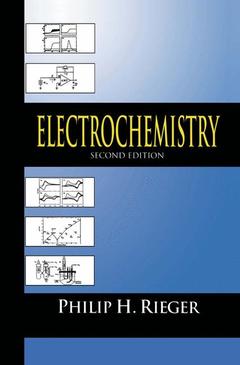Description
Electrochemistry (2nd Ed., 2nd ed. 1994. Softcover reprint of the original 2nd ed. 1994)
Author: Rieger P.H.
Language: English
Subject for Electrochemistry:
Publication date: 10-2012
483 p. · 15.5x23.5 cm · Paperback
483 p. · 15.5x23.5 cm · Paperback
Description
/li>Contents
/li>Comment
/li>
It has been fashionable to describe electrochemistry as a discipline at the interface between the branches of chemistry and many other sciences. A perusal of the table of contents will affirm that view. Electrochemistry finds applications in all branches of chemistry as well as in biology, biochemistry, and engineering; electrochemistry gives us batteries and fuel cells, electroplating and electrosynthesis, and a host of industrial and technological applications which are barely touched on in this book. However, I will maintain that electrochemistry is really a branch of physical chemistry. Electrochemistry grew out of the same tradition which gave physics the study of electricity and magnetism. The reputed founders of physical chemistry-Arrhenius, Ostwald, and van't Hoff-made many of their contributions in areas which would now be regarded as electrochemistry. With the post-World War II capture of physical chemistry by chemical physicists, electrochemists have tended to retreat into analytical chemistry, thus defining themselves out of a great tradition. G. N. Lewis defined physical chemistry as "the study of that which is interesting." I hope that the readers of this book will find that electrochemistry qualifies.
Preface; Electrode potentials: Introduction; Electrochemical cell thermodynamics; Some uses of standard potentials; Measurement of cell potentials; Reference and indicator electrodes; Ion-selective electrodes; Chemical analysis by potentiometry; Batteries and fuel cells; References; Problems; The electrified interface: The electric double layer; Some properties of colloids; Electrokinetic pheonomena; Eletrophoresis and related phenomena; Electrode double layer effects; Debye-Huckel theory; References; Problems; Electrolytic conductance: Conductivity; Conductance applications; Diffusion; Membrane and liquid junction potentials; References; Problems; Voltammetry of reversible systems: Diffusion-limited potentials; Experimental techniques; A survey of electroanalytical methods; Cyclic voltammetry; Polarography; Polarographic variations; The rotating-disk electrode; Microelectrodes; Applications; References; Problems; Mechanisms of electrode processes: Introduction; Spectroelectrochemistry; Steady-state voltammetry; Chronoamperometry and chronopotentiometry; Cyclic voltammetry; References; Problems; Electron-transfer kinetics: Kinetic of electron transfer; Current-overpotential curves; Electron-transfer rates from voltammetry; Faradaic impedence; References; Problems; Electrolysis: Bulk electrolysis; Analytical applications of electrolysis; Electrosynthesis; Industrial electrolysis processes; Corrosion; References; Problems; Appendices: Bibliography; Symbols and units; Electrochemical data; Laplace transform methods; Digital simulation methods; Answers to selected problems; Author index; Subject index.
Reviews of the first edition:, [Reiger's Electrochemistry] is very well written and presents the more challenging concepts of electrochemistry logically and lucidly .... A particularly attractive and unusual feature of this book is the frequent reference to the historic literature, the tracing of ideas back to their origins ..... These historical references and biographical notations make reading the text more interesting and tend to humanize the science. In my view, this feature alone makes the book worth owning. This book would be an excellent choice for use in an advanced undergraduate or first-year graduate-level course in general electrochemistry. - Analytical Chemistry., [This book] will certainly be a very precious teaching aid because of the valuable didactic approach, of the wealth of information on techniques, mechanisms, and their identification, and of its large supply of examples, problems, and references linking theory and practice. - Electrochemica Acta., [Reiger's Electrochemistry] is very well written and presents the more challenging concepts of electrochemistry logically and lucidly .... A particularly attractive and unusual feature of this book is the frequent reference to the historic literature, the tracing of ideas back to their origins ..... These historical references and biographical notations make reading the text more interesting and tend to humanize the science. In my view, this feature alone makes the book worth owning. This book would be an excellent choice for use in an advanced undergraduate or first-year graduate-level course in general electrochemistry. - Analytical Chemistry., [This book] will certainly be a very precious teaching aid because of the valuable didactic approach, of the wealth of information on techniques, mechanisms, and their identification, and of its large supply of examples, problems, and references linking theory and practice. - Electrochemica Acta., [This book] will certainly be a very precious teaching aid b
© 2024 LAVOISIER S.A.S.




